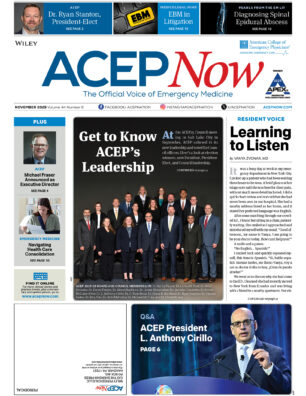President Lyndon Johnson signed the Medi-care program into law on July 30, 1965, and presented former president Harry S. Truman with the first Medicare card. The debates surrounding the establishment of the Medicare program were every bit as contentious as the current debates on health care reform.
Explore This Issue
ACEP News: Vol 29 – No 04 – April 2010Forty-five years later, few Americans would suggest that Medicare should be abolished, leaving the elderly without means to pay their health care bills. Fewer still would advocate for the abolishment of Social Security.
A New Deal president delivered the inspiration for the “Yes, We Can” generation.
The past year has seen an intense focus on the need for comprehensive reform of America’s health care system. With almost 50 million uninsured Americans and sharply rising costs in health care, the current system is unsustainable.
There is, however, considerable disagreement and controversy over how to fix the severely challenged health care system.
Over the past 3 years, ACEP has conducted various surveys and discussions with its officers, Board of Directors, the Council, the members of the Federal Government Affairs Committee, the State Legislative/Regulatory Committee, and other key committees concerning elements of comprehensive reform.
I have absolute confidence that our members have significant contributions to make in the effort to provide better health care.
These elements have included, but are not limited to, a single payer system, health savings accounts, health information technology, community rating, guaranteed issue, benefits, deductibles, and mandates.
Opinion has varied significantly in many of these areas, but these dialogues and inputs have guided the ACEP Board in taking the positions it has taken.
There are essential components of reform that exist in ACEP’s multiple policies and positions. And when health care reform took center stage last year on Capitol Hill, ACEP was poised with credible, thoughtful positions on key core issues.
(A summary of these can be found on www.ACEP.org in the Web site’s “Advocacy” area.)
ACEP is a representative democracy, and disagreement with any of its policies can and should be addressed in the form of a resolution to the Council, to be debated with and by your peers who represent a diversity of geography, practice environment, and specialized interests.
In addition, policy can be influenced by participation on committees, in sections, and in your local chapter. I encourage you to make your voice heard by contributing to the solutions.
Emergency physicians are innova-tors and problem solvers, and I have absolute confidence that our specialty and our members have significant contributions to make in the effort to provide better health care for all Americans.
Pages: 1 2 | Multi-Page




No Responses to “Making ACEP Members’ Voices Heard”